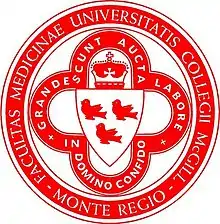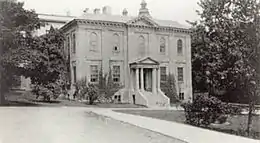McGill University Faculty of Medicine
The Faculty of Medicine is one of the constituent faculties of McGill University. It was established in 1829 after the Montreal Medical Institution was incorporated into McGill College as the college's first faculty; it was the first medical faculty to be established in Canada.[1] The Faculty awarded McGill's first degree, and Canada's first medical degree to William Leslie Logie in 1833.[2] His dissertation, "Medical inaugural dissertation on Cynanche trachealis" can be found in the McGill Library institutional repository, eScholarship@McGill.
 | |
| Type | Public |
|---|---|
| Established | 1829 |
| Dean | David Eidelman |
| Students | 688 MDCM, 35 MD-PhD, 10 MD-MBA |
| Location | , , |
| Campus | Urban |
| Website | https://www.mcgill.ca/medicine/ |
McGill's Faculty of Medicine is one of the most prestigious and well-regarded medical schools in the world. Many world-renowned researchers, physicians, clinicians, and pioneers within their respective fields have graduated from or have been affiliated with the faculty. Its graduates have gone on to found the Johns Hopkins University School of Medicine and the Johns Hopkins Hospital. There have been at least two Nobel Prize laureates who have completed their entire education at McGill University including MD at the McGill University Faculty of Medicine including Andrew Schally (Nobel Prize in Physiology or Medicine 1977) and David H. Hubel (Nobel Prize in Physiology or Medicine 1981).
History

The Montreal Medical Institution, was established in 1823 by four physicians, Andrew Fernando Holmes, John Stephenson, William Caldwell and William Robertson, all of whom had been trained at the University of Edinburgh Medical School, and were involved in the foundation of the Montreal General Hospital.[3] In 1829 it was incorporated into McGill College as the new College's first faculty; it thus became the first Faculty of Medicine in Canada. A highly didactic approach to medical education called the "Edinburgh curriculum", which consisted of two six-month courses of basic science lectures and two years of "walking the wards" at The Montreal General Hospital, was instituted. From 1833 to 1877 the Faculty followed the pattern set by the University of Edinburgh and required graduating students to submit an 'inaugural dissertation' - a database of these is available.[4]
Sir William Dawson, the principal of McGill, was instrumental in garnering resources for the faculty and pioneering contributions from Thomas Roddick, Francis Shepherd, George Ross and Sir William Osler helped to transform the Victorian era medical school into a leader in modern medical education. Osler graduated from the MDCM program at McGill University Faculty of Medicine in 1872, and co-founded the present-day Johns Hopkins School of Medicine in 1893.
In 1905, the Bishop's University Medical Faculty Montreal who established in Montreal in 1871 closed and amalgamated with McGill University to create the new McGill University Faculty of Medicine, where BU graduates such as Maude Abbott, one of the Canada's earliest female medical graduates transfered to work for McGill as the Curator of the McGill Medical Museum.
The McGill University Health Centre was part of a $2.355 billion Redevelopment Project on three sites - the Glen, the Montreal General and Lachine hospitals.[5] A new $1.300 billion MUHC Glen site fully integrated super-hospital complex opened in 2015.[6]
A new satellite campus for McGill Medicine for a French stream MD, CM program was established in 2020 for the Outaouais region with a graduating class size of 24 and total of 96 in the program. The establishment of the program is part of a $32.5-million construction project of the Groupe de médecine de famille (GMF-U) de Gatineau.[7]

Education
McGill University Faculty of Medicine offers a four-year medical M.D., C.M. degree (MDCM). MDCM is an abbreviation of the Latin Medicinae Doctor et Chirurgiae Magister, which means "doctor of medicine and master of surgery." The Faculty of Medicine also offers joint degree programs with other disciplines including business M.D.-M.B.A. and science/engineering M.D.-Ph.D.. There is also an accelerated program for selected graduates of the Quebec junior college (CEGEP) system (PRE-MED-ADM or MED-P) that combines one year of science curriculum with the four-year M.D., C.M. degrees.
In keeping with its history of educational and instructional relationship, the Faculty of Medicine is closely affiliated with the McGill University Faculty of Dentistry. Students in the Faculty of Dentistry receive instruction together with their medical student colleagues for the first 18 months of their professional training.[8]
The faculty includes three schools, the School of Communication Sciences and Disorders, School of Nursing, and the School of Physical and Occupational Therapy. It also includes several research centres involved in studies on, for example, pain, neuroscience, and aging. Most of the non-clinical parts of the faculty are housed in the McIntyre Medical Sciences Building ("The Beer Can", “McMed”), situated on McGill's downtown campus on the south side of Mount Royal between Avenue des Pins and Avenue Docteur-Penfield.[9]
Affiliations
.jpg.webp)
McGill University Health Centre[10]
- GLEN super hospital
- Montreal General Hospital
- Allan Memorial Institute (contains MGH's outpatient psychiatry)
- Montreal Neurological Hospital
- Hôpital de Lachine
McGill affiliate hospitals
- Lakeshore General Hospital
- Jewish General Hospital
- St. Mary's Hospital
- Douglas Mental Health University Institute
- Shriners Hospital for Children
- Hôpital de Gatineau - Groupe de médecine de famille universitaire (GMF-U) de Gatineau
Reputation
McGill's Faculty of Medicine has a strong national and international reputation with an impressive list of faculty and alumni, many of whom were pioneers in their respective fields. It is also ranked as the number 1 medical school nationally in Canada by Maclean's for 15 straight years (including the most recent ranking in 2020).[11] McGill's Medical School has also consistently ranked in the top medical schools worldwide and ranked 21st worldwide on a recent QS World University Ranking of top medical schools world-wide.[12] Particularly, among McGill University's renowned reputation of Rhodes Scholars, McGill's Faculty of Medicine has also produced a number of Rhodes Scholars including one in the recent 2018 cohort.[13] For medical school students entering in Fall 2020, the mean four-year undergraduate GPA was 3.87 (excluding graduate GPA), and the mean MCAT score was 32.1 (85th-88th percentile).[14][15][16]
Notable faculty and alumni
- Bernard Nathanson M.D., C.M. 1949 — renowned obstetrician/gynecologist
- Daniel Borsuk O.Q., B.Sc. 2000, M.D., C.M. 2006, M.B.A. 2006 — performed first face transplant in Canada
- Thomas Chang O.C., M.D., C.M., Ph.D., FRCP(C), FRS(C) — pioneer in biomedical engineering, “Father of Artificial Cells”
- Robert Thirsk O.C., O.B.C., M.D., C.M., M.S., M.B.A. — Canadian engineer and physician, astronaut, and chancellor emeritus University of Calgary.
- Joannie Rochette M.D., C.M. 2020 — medal-winning Olympic figure skater
- E. Fuller Torrey M.D., C.M. 1963 — renowned psychiatrist and schizophrenia researcher
- Charles Philippe Leblond — pioneer of cell biology and stem cell research
- Maurice Brodie M.D., C.M. 1928 — polio researcher
- Mark Cohen M.D., C.M. 1992 — ophthalmologist, laser eye surgeon and co-founder of LASIK MD
- Avi Wallerstein — ophthalmologist, laser eye surgeon and co-founder of LASIK MD
- Charles Scriver M.D., C.M. 1955 — eminent Canadian pediatrician and biochemical geneticist
- Dafydd Williams O.C., O.Ont., M.D., C.M. 1983, M.S., M.B.A. — a Canadian physician, public speaker, CEO, author and multi-mission astronaut.
- David R. Boyd M.D., C.M. 1963, — trauma surgeon, and developer of Regional Trauma Emergency Medical Services (EMS).[17]
- Charles R. Drew M.D., C.M. 1933 — physician and professor; patented a method of preserving human blood; became the founding medical director of the Red Cross Blood Bank in the United States[18]
- Richard Goldbloom O.C., O.N.S., M.D., C.M. 1949 — pediatrician, chancellor of Dalhousie University 1986-2004
- Paul Bruce Beeson M.D., C.M. 1933 — professor of medicine, specializing in infectious diseases; discoverer of interleukin-1
- Ian Stevenson M.D., C.M. 1943 — Canadian-born U.S. psychiatrist
- Laurent Duvernay-Tardif M.D., C.M. 2018 — offensive guard for the NFL's Kansas City Chiefs
- Phil Gold, B.Sc. 1957, M.Sc. 1961, M.D., C.M. 1961, Ph.D. 1965 — physician, scientist, and professor, discoverer of carcinoembryonic antigen (CEA), the first biomarker for cancer
- David Goltzman, B.Sc. 1966, M.D., C.M. 1968 — physician, scientist, and professor
- Andrew Fernando Holmes — first dean and co-founder of McGill College Medical Faculty
- David Hunter Hubel B.Sc. 1947, M.D., C.M. 1951 — Nobel laureate in Physiology (1981)
- Joanne Liu M.D., C.M. — International President of Médecins Sans Frontières (Doctors Without Borders)
- Colin MacLeod M.D., C.M. 1932 — Canadian-American geneticist, identified DNA as hereditary material in the body, Avery–MacLeod–McCarty experiment
- Joseph B. Martin — Dean of the Harvard Medical School, former chair of neurology and neurosurgery
- Jonathan Meakins B.Sc. 1962 — surgeon, immunologist
- Ronald Melzack Ph.D. 1954 — developed the McGill Pain Questionnaire
- Jack Wennberg M.D., C.M. 1961 — renowned pioneer in public health of medicine and founder of The Dartmouth Institute for Health Policy and Clinical Practice [19][20]
- Brenda Milner Ph.D. 1952 — neuropsychologist
- Robert Murray - B.A., M.A., M.D., C.M. 1943 - Bacteriologist[21]
- Clarke Fraser Ph.D. 1945, M.D., C.M. 1950 — pioneer in medical genetics
- Perry Rosenthal M.D., C.M. 1958 — professor of ophthalmology at Harvard Medical School and developer of the first gas-permeable scleral contact lens
- William Feindel — distinguished neurosurgeon and neuroscientist
- Santa J. Ono Ph.D. 1991 — immunologist and eye researcher, President & Vice-Chancellor University of British Columbia
- William Osler M.D., C.M. 1872 — professor, medical pioneer, developed bedside teaching, one of the four founders of the Johns Hopkins School of Medicine
- Wilder Penfield — neurosurgery pioneer, first director of the renowned Montreal Neurological Institute and Montreal Neurological Hospital
- Betty Price — anethesiologist and politician[22]
- Juda Hirsch Quastel — pioneer in neurochemistry and soil metabolism; Director of the McGill University-Montreal General Hospital Research Institute
- Edward Llewellyn-Thomas M.D., C.M. 1955 — English scientist, university professor and science fiction author
- Rocke Robertson B.Sc. 1932, M.D., C.M. 1936 — physician
- Victor Goldbloom O.Q., O.C., M.D., C.M. 1945 — pediatrician, prominent politician
- Cluny Macpherson M.D., C.M. 1901 — physician and inventor of the British Smoke Hood (an early gas mask)
- Thomas George Roddick M.D., C.M. 1868 — surgeon, politician and founder of the Medical Council of Canada
- Andrew Schally Ph.D. 1957 — Nobel laureate in Physiology (1977)
- John Stephenson — co-founder of McGill College Medical Faculty
- Arthur Vineberg B.Sc. 1928, Ph.D. 1933 — cardiac surgeon, pioneer of revascularization
- Sir Charles-Eugène-Napoléon Boucher de Boucherville M.D., C.M. 1843, Physician, politician, two-time Premier of Quebec
- R. Tait McKenzie M.D., C.M. 1892 — pioneer in physiotherapy
- C. Miller Fisher described lacunar strokes and identified transient ischemic attacks as stroke precursors.
- Edward William Archibald M.D., C.M. 1896 Canada's first neurosurgeon, renowned thoracic surgical pioneer
- Casey Albert Wood ophthalmologist and comparative zoologist
- Maude Abbott of Canada's earliest female medical graduates, international expert on congenital heart disease, namesake of Maude Abbott Medical Museum
See also
References
- Cruess, Richard L. "Brief history of Medicine at McGill". McGill University. Retrieved 15 September 2015.
- Crawford, DS. Montreal, medicine and William Leslie Logie: McGill's first graduate and Canada's first medical graduate. 175th. anniversary. [Osler Library Newsletter, No. 109, 2] https://www.mcgill.ca/library/files/library/No1092008.pdf
- "John Stephenson's Secret". McGill. McGill University. Retrieved 13 August 2014.
- MD and MDCM graduates and their theses 1833-1877. http://internatlibs.mcgill.ca/McGill-medical-theses/mcgill-theses.html
- https://www.cbc.ca/news/canada/montreal/former-snc-lavalin-vp-pleads-guilty-in-muhc-corruption-trial-1.4741765
- https://www.healthcarecan.ca/wp-content/themes/camyno/assets/document/NewsStories/2018/Preparing%20the%20Ground%20for%20Transformation.pdf
- https://publications.mcgill.ca/medenews/2019/04/12/campus-outaouais-takes-shape/
- "Canadian Dental Association - Dentistry at McGill — The First 100 Years" (PDF). Retrieved August 1, 2019.
- http://cac.mcgill.ca/campus/buildings/mcintyre_medical_sciences.html
- https://muhc.ca/muhc-glance
- "Archived copy". Retrieved October 25, 2019.
- "QS World University Rankings - Medicine". QS World University Rankings. 2020. Retrieved 21 October 2020.
- "McGill announces its 2018 Rhodes Scholars". Retrieved August 1, 2019.
- "Admissions - by the numbers". McGill University, Faculty of Medicine and Health Sciences. 2020. Retrieved 21 October 2020.
- "Archived copy". Archived from the original on June 11, 2011. Retrieved July 2, 2011.CS1 maint: archived copy as title (link)
- https://www.aamc.org/students/download/85332/data
- Boyd DR; Cowley RA (1983). "Comprehensive regional trauma emergency medical services (EMS) delivery systems: the United States experience". World Journal of Surgery. 7, (1): 149–157.
- https://www.uspto.gov/about-us/news-updates/patent-preserving-blood-issued-november-10-1942
- "Jack Wennberg, MD, MPH - Bio". The Dartmouth Institute for Health Policy and Clinical Practice. 2020. Retrieved 21 October 2020.
- https://www.mcc.ca/about/story/?cn-reloaded=1. Missing or empty
|title=(help) - Avery, Donald H.; Eaton, Mark, eds. (2008). The Meaning of Life: The Scientific and Social Experiences of Everitt and Robert Murray, 1930–1964. The Publications of the Champlain Society. ISBN 9781442620315.
- http://patch.com/georgia/roswell/betty-price-run-state-house-seat-0
Further reading
- Joseph Hanaway and Richard Cruess. "McGill Medicine, Volume 1, 1829-1885. The First Half Century".
- Joseph Hanaway, Richard Cruess, and James Darragh. "McGill Medicine, Volume II, 1885-1936".
External links
- Faculty of Medicine
- School of Communication Sciences and Disorders
- School of Nursing
- School of Physical and Occupational Therapy
- Medical Library Archives Collection, Osler Library Archives, McGill University. Collection of primary sources documenting the growth of the Medical Library at McGill University. Also includes announcements, university calendars, and directories related to the Faculty of Medicine